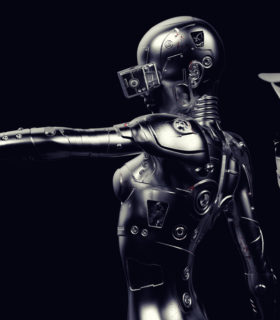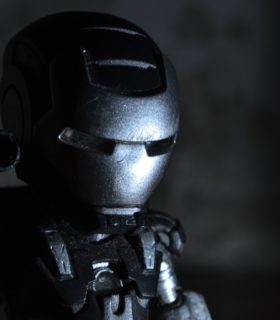Chicago. 2029.
The bracelet on Eric’s arm pinged for the second time on his run, sending a slight shock throughout his body. It was the same shock he imagined his dog got when he passed through the apartment building’s electric fence. He rolled his eyes and stopped, scarcely short of breath. At this rate, he had no chance of getting a decent workout in. The police drone approached him, its ovoid body slowly hovering about seven feet off the frosty concrete. The dullness of its gray exterior made the drone blend in with the sky, with only its flickering red and blue lights distinguishing it from the monochrome mundanity of Chicago’s January weather.
The drone stopped roughly three feet from Eric, its lights relatively dim, implying this was a minor violation.
“Greetings citizen. You have run within 200 feet of a city-licensed gym for the second time this week. Your third violation will result in a $1,000 fine. Is there any reason why this violation should not go on your record, such as an emergency?”
“No officer. Am I free to continue?” Eric scoffed, jogging in place both to continue his workout so he could get away from the drone as quickly as possible.
“Yes citizen. Please enjoy your run, but remember that going to a licensed gym is the best way to improve your health,” the drone said before flying away.
There it was again, public health. The reason every runner in Chicago had to wear those damn bracelets.
The obesity crisis had gone on for over two decades. The City first enacted the 200-foot rule in 2019, which was a way for people eat at restaurants instead of less affluent options like food trucks and street vendors, who had to be at least 200 feet away from restaurants at all times or face a fine.
Not long after, The City decided that it was reasonable to make sure that grocery stores had the same level of protection as restaurants. If anything, they needed more, because supermarkets served healthier food than restaurants did. This forced the street vendors into the worst parts of the city, if not out of it altogether. While Eric heard there were some economic losses, The City reassured him that public health was more important than any amount of money.
Still, the obesity crisis continued. With the food market covered, The City turned its attention to physical fitness, mandating that everyone was forced to spend at least half an hour exercising every day. Yet with people finding ways to get around the system at home, The City promoted the use of gyms, and their cameras made it easy to observe who was actually working out. This finally made a dent in the city’s obesity rate. Now, those stubborn few who would rather work out in fresh air had to stay 200 feet away from gyms, as it was unfair to take from businesses who had done so much to help The City solve its obesity crisis.
The rule had led to a boom in gym construction, and Eric had not been able to plan a route around all the new ones yet. At least The City gave runners bracelets instead of those burdensome ankle monitors they gave those street vendors.
Leaving the drone behind, Eric turned the corner to the next block. He’d forgotten that a new gym had just opened there on Monday. Thankfully, his Christmas bonus would pay for the fine.
Eric’s bracelet shocked him again. It was much stronger than usual this time.
Freddie Bastiat is a law student whose real name you’ll find out once Andrew Kacynski doxxes him. He’s a fan of hockey, Yoko Taro games, and restoring the Byzantine and Achaemenid Empires. You can find him on Twitter @Tht_Fat_Bastiat.


